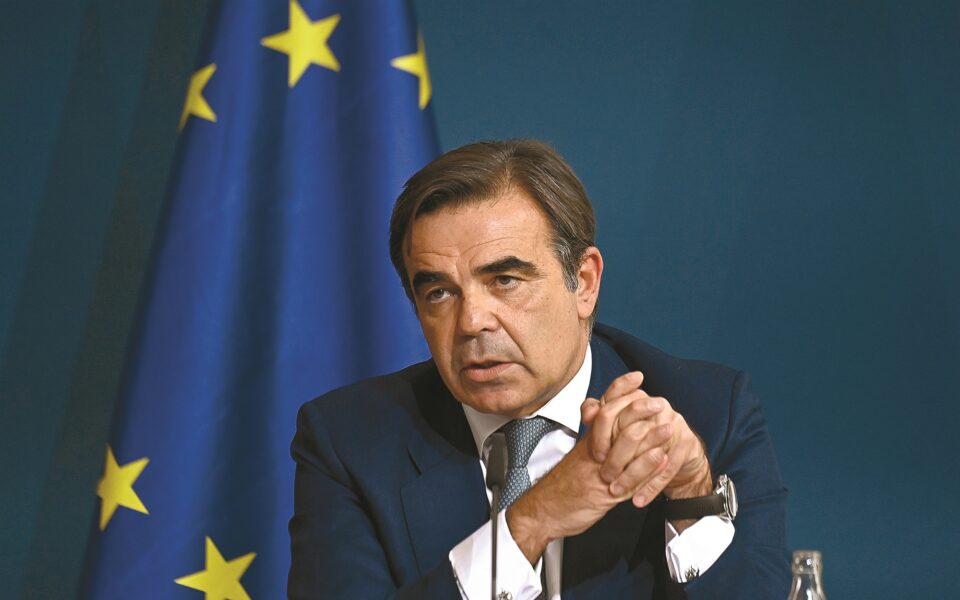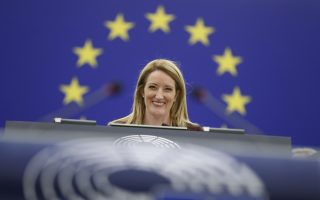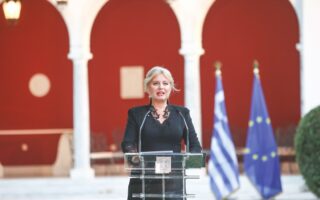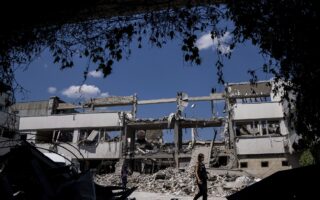EU and Greece are ‘together’ over migration
Brussels is not only aware of pressure on the bloc’s eastern border, but helping manage it, says Commission VP

In the runup to a crucial European Union summit in Tirana in early December that will determine the fate of the Western Balkans, EU Commission President Ursula von der Leyen and Vice President for the European Way of Life Maragaritis Schinas are on the tour path, visiting the candidate countries.
In this interview with Kathimerini, Schinas discusses the hot-button issue of the refugee crisis and the games being played along the so-called “Balkan corridor,” from Turkey all the way to Serbia.
He talks about the mistakes and injustices committed by the EU at the expense of the Western Balkans and about pro-Russian sentiment in the region, and also refers to his meetings with Recep Tayyip Erdogan, saying that the Turkish president “no longer regards himself as a secular leader, but believes his leadership has assumed a spiritual dimension.”
How would you describe the climate during your recent tour of the Western Balkans?
I visited the area just after the meeting of all the European heads of state in Prague and shortly before the president’s tour of the Western Balkans. The timing was very good because we wanted to get a sense of the mood.
The first observation we made was that the people, public opinion in the Balkans is staunchly committed to a European trajectory. It has its eyes turned to Europe, and also has ties with Europe via its diaspora. The second thing we notice is that their leaderships are trying to explain the delays in the accession process and often fall victim politically to the sirens of other forces. The leaderships are not quite where we would like them to be in terms of defending the European path. The third and also very important thing I saw was that the political clock of enlargement is clearly falling behind the social clock. While the people want Europe, the negotiations have not made the corresponding progress. There is a time lapse that has only been exacerbated by the events in Ukraine.
And, of course, I also addressed the issue of controlling migrant flows. You know, we always need to remind these countries that they will only gain by working with Europe, not against it, on crucial issues like visas, border control and the presence of Frontex all along the Balkan corridor.
What is the view in Brussels on the immigration issue? Is it giving transit countries money and expecting them to get on with it, or does it feel like it shares the problem?
The problem we have right now on the Balkan corridor is very real. The flow of irregular migrants through the Balkans to Europe has increased threefold. The main reason is that the Serbian government has struck free visa agreements with countries like India, Burundi and Tunisia, thus opening the door to Europe to the world, as Serbia has visa-waiver access. This was a backdoor that had to be shut and following my visit, President [Aleksandar] Vucic honored the pledge he made to abolish these visas. It was a tangible achievement. The second part of the Balkan corridor issue is that we need Frontex to be everywhere. But since Frontex is legally bound to operate only on the borders with EU countries and we want it to also be on the border with third countries such as Serbia and North Macedonia, we need to secure the approval of those countries, which is something I did. They agreed and very soon we will have Frontex on the Serbia-North Macedonia border too.
Overall, movement along the Balkan corridor is not at the level it was during the Idomeni [northern Greece] crisis [of 2015], but it is starting to heat up. And as far as the desire by the leaderships of some Balkan countries to open up the game to third countries is concerned, we will remind them that they need to close these doors firmly. Did our Serbian friends think we wouldn’t notice that Indians were among the top 10 nationalities seeking asylum for the first time? Did they believe we wouldn’t investigate where they came from? In Austria, Indians are the top national group seeking asylum.
‘The Turkish state is not always as diligent about guarding the borders as we need it to be. Sometimes it is, and sometimes it’s not’
Are you concerned about the recent events at Evros, on Greece’s northeastern border with Turkey?
To begin with, the paradigm of migration policy in Greece has changed in the past three years. Europe has given more money to Greece for handling migration than anyone else among the 27 member-states. Secondly, we inherited the shame of Moria and built five ultramodern reception centers on the five islands of the northeastern Aegean entirely with funding from the community budget. The new facilities on Samos, Leros and Kos are ready and those on Lesvos and Chios are almost done, allowing Greece to start fresh on a European foundation: People will be received in humane conditions and processed quickly so we can ascertain who’s entitled to apply for asylum and who is not, so the latter can be returned. Thirdly, Greece has the biggest Frontex mission in Europe: on the Evros border and on the islands. Therefore, those who want to make Greece and Europe appear at odds over the migration issue have the wrong end of the stick, because not only are we entirely aware of the situation in Greece, we are basically together with Greece in its management.
What does Brussels have to say to Greek claims that Turkish President Recep Tayyip Erdogan is instrumentalizing the refugee crisis?
We have experienced this instrumentalization on Europe’s external borders on three major occasions in the past three years: in February 2020 in Evros, in May 2020 in Ceuta, the Spanish autonomous city on the Moroccan side of the Mediterranean, and in the summer of 2021, with [Aleksandr Grigorievich] Lukashenko in Belarus, when he effectively opened the gates to Lithuania. These incidents, these hybrid attacks, gave us know-how in dealing with such instrumentalization. Meaning: reacting promptly, being present, deploying Frontex forces, communicating with the provenance and transit countries to stop the flow. As far as Turkey is concerned and following the events at Evros, I don’t think we have a case of constant instrumentalization, but we do have games. What I mean is that the Turkish state is not always as diligent about guarding the borders as we need it to be. Sometimes it is, and sometimes it’s not.
Even though it is getting money…
Yes, but that money is for managing the immigration flows on the border with Syria and now we will give them more money to bolster and improve control of their border to the east, with Afghanistan and Iran, because we have an increase there too.
Will the money be significant?
We are giving them 200 million euros to strengthen their eastern borders because it is in Europe’s interest that Turkey should control its eastern borders. We want all of this to lead to Turkey taking a more uniform and consistent approach to its management of migration, especially after Evros. They can’t push them to Europe in February 2020, then close the borders, then continue reopening and closing them. What we hope to achieve is a more coordinated policy.
Is there any basis to the rumors that have been circulating, online mainly, about the impending arrival of tens of thousands of Syrian refugees from Turkey?
We’ve learned to be a bit cautious about information that is circulated on the internet and even more so about information that offers a superficial or convenient appraisal of a picture. A photograph of refugees, for example, does not tell you the whole story about where they’ve come from or where they’re going. We do not, therefore, have the picture of a threatened general push toward Europe’s external borders. The problem we have, as I said earlier, is an inconsistent approach to the management of refugee flows by Turkey. And mainly the fact that this is now shifting to Turkey’s southern shores – as a result of the very good checks being carried out by the Greek government and Frontex in the Aegean – and we’re seeing flows covering long distances in large sailboats and other vessels toward Southern Italy and Central Europe. Turkey has an obligation to stop these flows. We can’t have big boats carrying 80, 100, 150 or even more irregular migrants leaving southern Turkey unchecked.
Are you concerned about a fresh tsunami of refugees coming into Europe if the Ukraine conflict expands?
First of all, the tsunami already happened in the first four weeks of the war. We took in 6 million Ukrainians and gave them immediate access to the job market, to education, to health and to accommodation. Of those, half and more have already gone back and this is proof that European migration policy can handle such situations smartly. Now, our current information does not paint a picture of a geographical expansion of the war beyond Ukraine and we have no scenarios of major new population movements. But in the unlikely event that this happens, we now have the know-how.
What should the people of the Western Balkans expect from next month’s summit in the Albanian capital? You recently referred to it as the “moment of truth.”
This summit is indeed a moment of truth, basically because its main purpose is to state that the political ties with the Western Balkans are firm and cannot be undone. And this is not something that will emerge from low-level technical talks or the tours of commissioners and vice presidents; it is a message that needs to come from the highest political level.
Will the message be sent or will we have the usual hemming and hawing?
I believe that it will. It is also important that this is the first summit that will be actually held in the Western Balkans. The summit needs to offer some arrangement, a sense of security, some assurances that in these difficult times of war, the European embrace will cover the people of the Balkans too in matters of energy, protection of citizens and the consequences of the war.
You have spoken of past mistakes. What were they?
Apart from the delay with the [Covid] vaccines, another mistake was that we have occasionally given the impression that we’re moving the goalposts. The case of North Macedonia is a typical example. Skopje did exactly what Europe asked of it – echoing Greek thoughts – and instead of accelerating negotiations when it did, we stopped them. It was unfair because we stopped them first because of France and the impending elections there and then again – when the issue was France was resolved – because of Bulgaria. North Macedonia paid the price for the government instability in Bulgaria and that is wrong. Even though there’s a reason for it, the delay is a mistake overall.
Did you see any signs of traditional pro-Russian sentiment among Western Balkan societies waning as a result of President Vladimir Putin’s aggression?
I would use the present tense, saying that the sentiment is subsiding and that the war has served as a turning point that revealed the futility of this relationship. Of course, there is nothing bad about the cultural relationship between Russia and the Western Balkans. But ties with a regime that is authoritarian and oppressive, that is committing an act of aggression and has trampled on every concept of international law, that does not offer good prospects for a geopolitical alliance. And no one wants to be with them.





